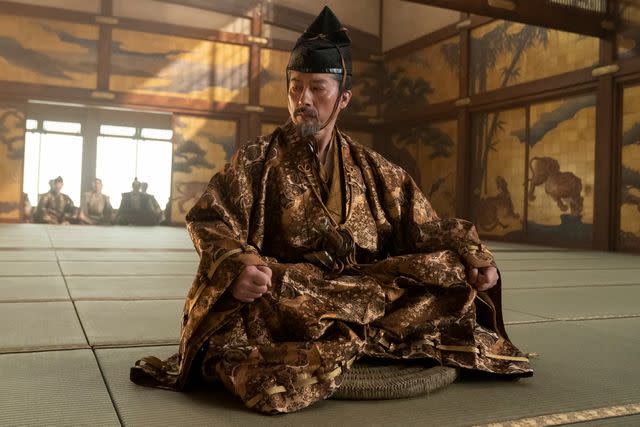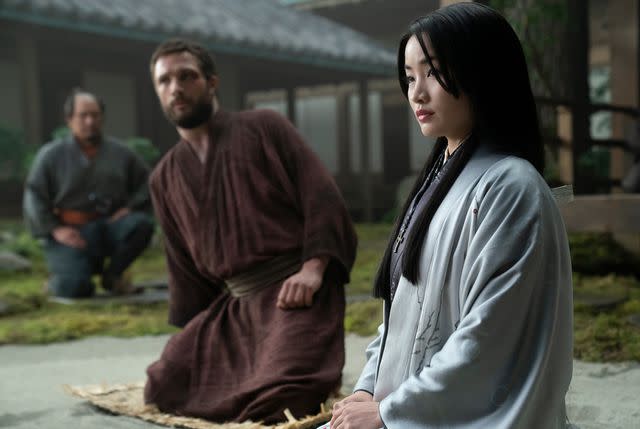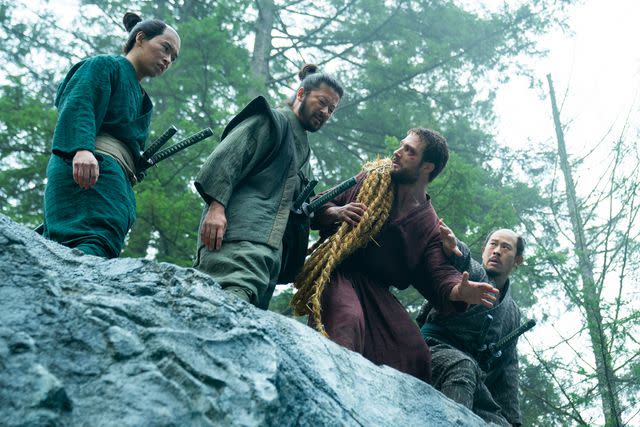“Shōgun” review: An extraordinary historical epic with heart
- Oops!Something went wrong.Please try again later.
The FX series based on James Clavell's blockbuster novel is a thrilling and emotional historical saga.
Thirty-one years before HBO’s adaptation of George R.R. Martin’s A Song of Ice and Fire captivated viewers, Shōgun got Americans hooked on a swords-and-daggers saga about a grand power struggle in a feudal otherworld. The nine-hour NBC miniseries — based James Clavell’s blockbuster novel about an Englishman who stumbles into a power struggle in feudal Japan — averaged 25 million viewers a night and helped launch the miniseries boom that began with Roots.
It is a bit shocking that it’s taken so long for a network to revisit this megahit IP, and fortunately for FX and Hulu, the long-gestating production — first announced in 2018 — was worth the wait. Gorgeous and immersive from the very first frame, the new Shōgun is a stunning epic that never lets big-budget set pieces overshadow the human drama at its core.
Pilot Major John Blackthorne (Cosmo Jarvis) is near death when his ship washes up on the coast of Ajiro, Japan in the year 1600. He’s a Protestant, sent to locate “the Japans” by the Church of England, which wants to wrest the island nation’s lucrative trade business from the Portuguese Catholic church. Blackthorne’s arrival comes just as Yoshii Toranaga (Hiroyuki Sanada), Lord of the Kantō region, is facing a possible death sentence from the country’s Council of Regents, who fear he’s amassed too much power. Seeing the grimy English “barbarian” — and his ship full of modern artillery — as a possible source of leverage, Toranaga takes Blackthorne into his custody. Employing his loyal vassal Mariko (Anna Sawai) as translator, Toranaga uses the sailor to learn more about the Western world, hoping to the turn the enmity between the Catholics and Protestants to his advantage in his battle with the Regents.

Katie Yu/FX
The ongoing allure of Clavell’s deeply researched tale — which also spawned video games, a board game, and a Broadway show — stems from its blend of spellbinding palace intrigue with the unfortunately timeless themes of prejudice and xenophobia. The premiere, “Anjin,” establishes the dramatic stakes in the first 20 minutes through Toranaga’s agonizingly suspenseful meeting with the council. The warning issued by Council head Ishido Kazunari (Takehiro Hira) so enrages one of Toranaga's soldiers (Yuki Takao), the tense meeting almost explodes into bloodshed — until Toranaga, a man who vows never to break a peace, scolds his vassal with a fearsome rebuke. It’s the first of many hold-your-breath moments that will unfold throughout the season.
And early on, Blackthorne’s conviction that the Japanese are “godless savages” is challenged when one of Toranaga’s men, Kashigi Yabushige (Tadanobu Asano), prepares to commit seppuku — a ritualistic samurai suicide — after failing to rescue a sailor who was thrown overboard. The incident leaves the Englishman stunned and terrified; it will take him months to understand the key role that honor, loyalty, and faith play in his captors’ culture. Meanwhile, Blackthorne develops a friendship of sorts with Toranaga, who appreciates the foreigner's quick mind and knack for persuasion.

Katie Yu/FX
Cosmo Jarvis and Anna Sawai in 'Shōgun'Shōgun’s central relationship, though, is between Blackthorne and Mariko. Even viewers who aren’t familiar with Clavell’s novel or the NBC miniseries will recognize the duo as star-crossed lovers from the outset. Thrown together by Toranaga, and alternately fascinated by and infuriated with each other, Blackthorne and Mariko grow closer even as they clash over their views on religion and what’s best for Lord Toranaga. The series explores the many contrasts between Japanese and Western cultures through Mariko and Blackthorne’s opposing personal philosophies: Noble suffering versus unfettered self-determination.
The Englishman, drawn to the life of a seaman by the “no tomorrow” freedom it offers, views the world through a lens of self-interest. Mariko, who has longed to die ever since her entire family was murdered, instead endures her duty to Toranaga — and her marriage to the abusive Buntaro (Shinnosuke Abe) — with unwavering discipline and stoicism. “Honestly, shuffling around with your manners and your buried self — for what?” Blackthorne barks at her in one of their increasingly intimate confrontations. Mariko is unmoved: “If freedom is all you ever live for, you will never be free of yourself.” While she appears to live in servitude to Japan’s patriarchy, Shōgun slowly reveals the ways Mariko and her female peers regularly save the men from themselves.
Mariko also takes part in some of the series' exquisitely constructed action sequences, as when she attempts to spear-fight her way out of Ishido’s castle. Clavell’s story is meant to be told on a grand scale, and Shōgun has no shortage of epic, breathtaking battles — showdowns at sea, arrow-filled ambushes in the forest, hand-to-hand combat between silent assassins and their very unwilling targets. Many outlets, including this one, have compared the series to Game of Thrones, and I can report it shares at least one quality with that HBO franchise: Several of Shōgun’s action scenes are simply too dark. Like, “turn the brightness up all the way on your screen and you’re still squinting to make out what's going on” dark. It’s disappointing, because when the sequences are fully visible, they are both beautiful to look at and intensely emotional, especially as we grow more attached to the sprawling cast of characters.

Katie Yu/FX
In the 1980 miniseries, Mariko (portrayed by the luminous Yoko Shimada) was generally soft-spoken and submissive; here, Sawai (Pachinko) plays her with the steely strength and spirited temper befitting a more modern audience. Jarvis delivers the confidence and arrogance Richard Chamberlain brought to the role 34 years ago, but the Peaky Blinders star adds an additional layer of skepticism and wry humor to his John Blackthorne — especially in his befuddled reactions to life in this new world. (“Two baths in a week? What, do you want me to catch the flux?”) And Blackthorne’s insult-driven friendship with fellow sailor Vasco Rodrigues (Nestor Carbonell, sporting a prodigious beard and radiating swagger) provide some of Shōgun’s funniest moments in the first few episodes.
Even in a cast full of standouts, Tadanobu Asano is remarkable as the scheming Yabushige, a wily and slightly unhinged mercenary who deftly plays Toranaga against Ishido in his quest for security and power. While Mariko and Blackthorne serve as Shōgun’s romantic heart, I was most moved by the bond between Lord Toranaga and his most loyal — and forthright — vassal, Hiromatsu (Tokuma Nishioka). After decades of friendship with his Lord, Hiromatsu jokes easily with Toranaga and challenges his decisions when warranted. Their relationship climaxes with a verbal showdown late in the season that is almost unbearable to watch, as Sanada and Nishioka summon the fathomless love and respect underlying the confrontation. Of all the heart-stopping battles in Shōgun, this painful argument between two dignified old men who love each other may be the toughest to forget. Grade: A-
Shōgun premieres Tuesday, Feb. 27, on Hulu and at 10 p.m. ET/PT on FX.
Sign up for Entertainment Weekly's free daily newsletter to get breaking TV news, exclusive first looks, recaps, reviews, interviews with your favorite stars, and more.
Related content:
Read the original article on Entertainment Weekly.

